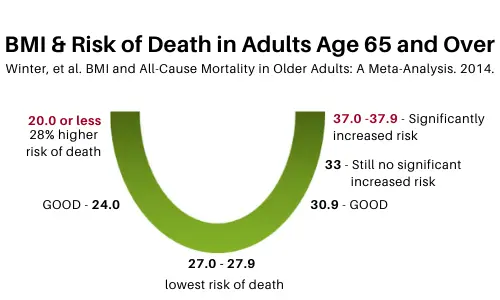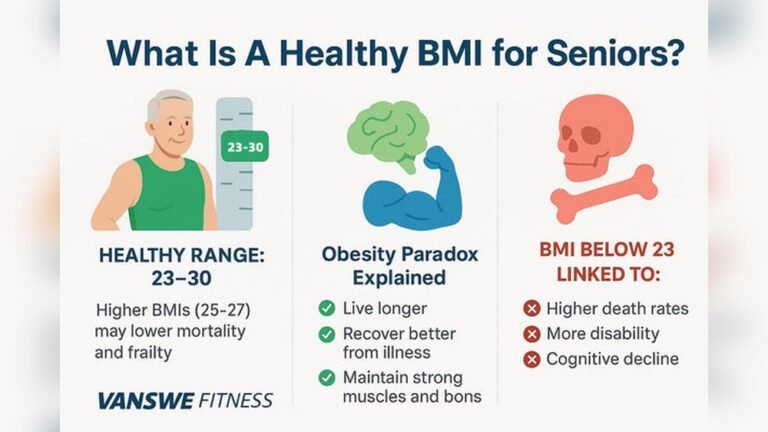Are you wondering what your ideal body weight should be as you age? Understanding BMI for seniors is more important than ever.
Unlike younger adults, your body changes in ways that make standard BMI charts less reliable. You might be surprised to learn that a slightly higher BMI could actually protect you from illness and injury. On the other hand, having a low BMI might put you at risk for frailty and falls.
This article will help you make sense of these unique factors and show you how to focus on what really matters—maintaining a healthy, stable weight that supports your strength and independence. Keep reading to discover practical tips, BMI ranges tailored for seniors, and why consulting your doctor is key to your health journey. Your well-being starts here.
Bmi Basics For Seniors
BMI Basics for Seniors offer a simple way to understand body weight and health. BMI stands for Body Mass Index. It helps estimate if a person’s weight is healthy for their height. This measurement is widely used in healthcare to check weight status quickly.
For seniors, BMI can provide useful insights. But it is important to know what BMI actually measures and its limits. This knowledge helps seniors and caregivers make better health decisions.
What Bmi Measures
BMI measures the ratio of weight to height. It is calculated by dividing weight in kilograms by height in meters squared. The result shows if a person is underweight, normal weight, overweight, or obese. BMI does not measure body fat directly but gives a rough estimate. It is a quick tool to screen for weight-related health risks.
Standard Bmi Categories
The standard BMI categories are easy to remember. A BMI below 18.5 means underweight. Between 18.5 and 24.9 is normal weight. A BMI from 25 to 29.9 is overweight. A BMI of 30 or higher means obesity. These categories help doctors and seniors understand health risks linked to weight.
Limitations For Older Adults
For older adults, BMI has some limits. It does not consider muscle loss common in aging. Muscle weighs more than fat, so BMI might misclassify muscle loss as healthy weight. Seniors may appear overweight but have low muscle mass. Also, a higher BMI can protect against illness in older age. Frailty and weight loss are risks too. Weight stability is often more important than a specific BMI number. Seniors should discuss BMI results with a healthcare provider for personalized advice.
Unique Bmi Factors In Aging
Body Mass Index (BMI) behaves differently in older adults compared to younger people. Aging brings changes in muscle, fat, and bone mass. These changes affect how BMI relates to health in seniors. Understanding these unique factors helps in assessing health risks and benefits more accurately.
Many studies show that BMI values and their health implications for seniors do not follow the same rules as for younger adults. The meaning of low or high BMI shifts with age, requiring a fresh look at weight and health for older adults.
Obesity Paradox In Seniors
The “obesity paradox” describes an unusual finding in seniors. Older adults with slightly higher BMI may live longer than those with low or normal BMI. Extra weight can provide energy reserves during illness or stress. This paradox challenges the idea that lower BMI is always better for health in older age.
Risks Of Low Bmi
Low BMI in seniors links to serious health risks. It often signals frailty, poor nutrition, and loss of muscle strength. These factors increase the chance of falls and fractures. Seniors with low BMI also face higher risks of infections and longer recovery times from illness.
Benefits Of Higher Bmi
Higher BMI may offer protection for seniors. A moderate amount of extra weight supports the body during health challenges. It can help maintain muscle mass and bone density. This protection helps reduce the risk of hospital stays and complications from diseases.
Healthy Weight Goals
Setting healthy weight goals is important for seniors to maintain good health. Weight affects energy, mobility, and overall well-being. Goals should focus on balance, not drastic changes. A stable, healthy weight supports daily activities and reduces health risks.
Achieving this involves understanding ideal BMI ranges, maintaining steady weight, and preserving muscle mass. These factors work together to keep seniors strong and active.
Ideal Bmi Range For Elderly
The ideal BMI range for seniors differs from younger adults. A BMI between 23 and 29 is often recommended. This range helps avoid risks linked to being too thin or too heavy. Lower BMI values may increase frailty and fall risks. Slightly higher BMI can offer protection during illness.
Focus On Weight Stability
Weight stability is more important than reaching a perfect number. Sudden weight loss or gain can signal health problems. Keeping weight steady helps maintain energy and reduces stress on the body. Regular check-ups can help monitor changes and guide healthy habits.
Muscle Mass Preservation
Maintaining muscle is key for seniors’ strength and independence. Muscle loss leads to weakness and balance issues. Combining proper nutrition with light exercise supports muscle health. Preserved muscle mass improves mobility and lowers fall risk.

Credit: www.vanswefitness.com
Assessing Bmi Accurately
Assessing BMI accurately in seniors requires careful attention to their unique body changes. Age affects muscle mass, bone density, and fat distribution, which impacts BMI readings. Standard BMI ranges may not fully represent a senior’s health. Accurate evaluation helps guide better health decisions and weight management.
Geriatric Bmi Calculation
Geriatric BMI calculation starts with the same formula as adults: weight in kilograms divided by height in meters squared. The difference lies in interpreting the results. Seniors may have more fat but less muscle. This can make their BMI seem normal while hiding health risks. Adjusted BMI categories for seniors provide clearer insight into their health status.
Using Bmi Calculators For Seniors
BMI calculators designed for seniors make the process easier and more accurate. These tools often include adjustments for age-related changes. Inputting weight and height gives a quick BMI estimate. Some calculators also consider factors like muscle loss and bone density. Using these tools helps seniors and caregivers track health more effectively.
Consulting Healthcare Providers
Healthcare providers offer the best advice for interpreting BMI in seniors. They consider medical history, lifestyle, and other health conditions. A doctor can recommend additional tests to assess body composition and nutrition. Regular consultations ensure that BMI data supports a safe and personalized health plan. Professional guidance helps seniors maintain a healthy weight and prevent complications.
Managing Weight Safely
Managing weight safely is crucial for seniors to maintain health and independence. Aging changes the body, affecting metabolism and muscle mass. These changes require a careful approach to weight management. It helps prevent falls, illnesses, and supports overall well-being. A balanced diet, regular exercise, and monitoring weight changes are key steps.
Balanced Diet Tips
Eat a variety of fruits and vegetables daily. Include lean proteins like fish, chicken, and beans. Choose whole grains over refined ones for better energy. Limit sugary snacks and processed foods. Drink plenty of water to stay hydrated. Smaller, frequent meals can help maintain energy and digestion.
Strength And Aerobic Exercises
Combine strength training and aerobic activities for best results. Strength exercises build muscle and improve balance. Walking, swimming, or cycling boost heart health. Aim for at least 150 minutes of moderate exercise weekly. Always start slowly and increase activity gradually. Consult a doctor before beginning new workouts.
Monitoring Changes Over Time
Track weight regularly to notice trends early. Keep a journal of weight, diet, and activity. Watch for sudden weight loss or gain and report to a doctor. Use BMI as a guide, but remember it’s one part of health. Focus on overall well-being, strength, and energy levels too.

Credit: thegeriatricdietitian.com
Tools And Resources
Assessing BMI for seniors requires the right tools and resources. Accurate measurement helps monitor health and guides lifestyle choices. Various aids simplify this process, making it easier to understand body weight in older adults.
Bmi Charts For Senior Women
BMI charts designed for senior women show healthy weight ranges clearly. These charts consider age-related body changes that affect weight. Using age-specific charts helps avoid misunderstandings about health risks. Seniors can compare their BMI with recommended ranges to track wellness effectively.
Online Bmi Calculators
Online BMI calculators offer quick and easy BMI measurement. Users enter height and weight, and the tool calculates BMI instantly. Some calculators cater specifically to seniors, adjusting results for better accuracy. These tools are available on many health websites and apps, making them accessible anytime.
Professional Guidance And Support
Healthcare professionals provide valuable advice on interpreting BMI results. Doctors and dietitians help seniors understand how weight affects overall health. They offer personalized plans for diet and exercise based on individual needs. Regular check-ups ensure that seniors maintain a healthy weight safely.
Health Implications Of Bmi
Body Mass Index (BMI) plays a significant role in assessing health among seniors. It helps identify risks related to weight that affect overall well-being. Understanding the health implications of BMI guides better care and lifestyle choices for older adults.
Both low and high BMI values can impact seniors differently. It is crucial to know how BMI influences frailty, chronic diseases, and quality of life to support healthy aging.
Frailty And Fall Risks
A low BMI often means less muscle and fat, leading to frailty. Frail seniors face greater chances of weakness and loss of balance. This increases the risk of falls, which can cause serious injuries. Maintaining a healthy weight supports stronger muscles and better stability.
Chronic Disease Connections
High BMI in seniors links to diseases like diabetes, heart problems, and arthritis. Excess weight strains the body and worsens these conditions. On the other hand, very low BMI may signal malnutrition, weakening the immune system. Balanced weight helps reduce disease risks and improves body function.
Longevity And Quality Of Life
Maintaining a stable BMI promotes longer life and better daily functioning. Extreme BMI values can shorten lifespan and reduce energy levels. Healthy weight supports mobility, mental health, and independence. Seniors with balanced BMI often enjoy improved life quality and active lifestyles.

Credit: www.drlogy.com
Frequently Asked Questions
What Is A Healthy Bmi For The Elderly?
A healthy BMI for the elderly typically ranges from 23 to 29. 9. Maintaining stable weight supports better health. Consult a healthcare provider for personalized guidance. Preserving muscle mass through strength training benefits aging adults.
What Weight Should I Be At 70 Years Old?
A healthy weight at 70 depends on height and body composition. Aim for a BMI between 23 and 29. 9. Focus on weight stability and muscle preservation. Always consult your doctor for personalized advice and adjustments.
What Is The Correct Bmi For My Age?
The correct BMI for older adults typically ranges from 23 to 29. 9. Focus on weight stability and preserving muscle mass. Consult a healthcare provider for personalized advice based on your health and age.
Why Should Seniors Have A Higher Bmi?
Seniors benefit from a higher BMI as it reduces frailty, supports muscle strength, and offers protection against illness and injury. Maintaining stable weight helps prevent malnutrition and falls. Consulting a doctor ensures personalized, healthy weight goals for aging individuals.
Conclusion
Understanding BMI for seniors helps promote healthier aging and wellness. Maintaining a stable weight often matters more than hitting exact BMI numbers. Low BMI can increase risks like frailty and falls, while a slightly higher BMI may offer protection. Always discuss weight concerns with a healthcare provider to find the best personal goals.
Tracking BMI is just one part of staying healthy in later years. Balance, nutrition, and regular check-ups support a better quality of life. Keep learning and caring for your body as you age.


